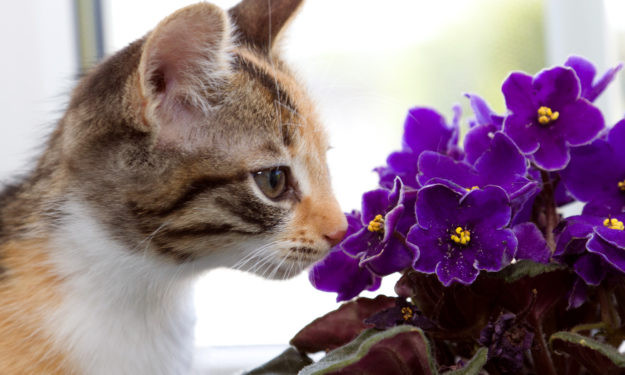Spring is a beautiful time of year, bringing with it vibrant blooms like daisies. You might be thinking of adding these cheerful flowers to your home or garden. But if you’re a cat owner, it’s crucial to consider the safety of your feline friend when bringing new plants into your environment. You might be wondering: Are Daisies Poisonous To Cats? The short answer is yes, common daisies can be toxic to cats. Let’s delve into what makes daisies harmful to cats, what symptoms to watch out for, and how to keep your kitty safe.
Understanding Daisy Toxicity to Cats
Daisies, particularly the common varieties with white petals and yellow centers, contain sesquiterpene lactones and other irritants that are toxic to cats, as well as dogs and horses. While not as severely poisonous as lilies, daisies can still cause unpleasant and potentially concerning symptoms in your feline companion if ingested.
Are All Daisies Toxic?
It’s important to clarify that while common daisies (often Bellis perennis) are considered toxic to cats, Gerbera daisies are often cited as being non-toxic or less toxic. However, it’s always best to err on the side of caution. Even Gerbera daisies, while less likely to cause severe poisoning, could still lead to mild gastrointestinal upset in sensitive cats. For the purpose of cat safety, it’s generally recommended to consider all types of daisies as potentially harmful if ingested.
Toxic Compounds in Daisies
The primary culprits behind daisy toxicity are sesquiterpene lactones. These compounds can cause irritation to the gastrointestinal tract when ingested. Other irritant compounds within daisies can also contribute to skin irritation if a cat comes into contact with the plant sap.
Symptoms of Daisy Poisoning in Cats
If your cat has ingested part of a daisy plant, they may exhibit several symptoms. The severity of symptoms can depend on the amount ingested and the cat’s individual sensitivity. Common signs of daisy poisoning in cats include:
- Vomiting: This is a common reaction as the cat’s body tries to expel the toxic substances.
- Diarrhea: Irritation of the digestive system can lead to loose stools.
- Drooling: Increased salivation can occur due to nausea or irritation in the mouth.
- Loss of Appetite: Your cat may refuse food due to feeling unwell.
- Lethargy: They might appear weak, tired, or less active than usual.
- Skin Irritation: If your cat has rubbed against daisies, they may develop skin redness, itching, or irritation.
- Trouble Walking/Incoordination: In more severe cases, neurological symptoms like incoordination can occur, though this is less common with daisy poisoning compared to more highly toxic plants.
 cat-sniffing-african-violets-625×375.jpg
cat-sniffing-african-violets-625×375.jpg
A curious cat cautiously investigates flowers, highlighting the importance of ensuring pet-safe plant choices in homes with feline companions.
Prevention and Safe Alternatives
The best approach is always prevention. Keeping daisies out of reach of your cats is crucial to avoid any potential poisoning.
How to Keep Cats Away from Daisies
- Keep Daisies Out of Reach: If you receive daisies in a bouquet, place them in a location that is completely inaccessible to your cat. High shelves or rooms your cat cannot enter are good options.
- Outdoor Gardens: If you have daisies in your garden, consider using pet-safe deterrents to keep cats away from these areas. Physical barriers like fencing can be effective. You can also try using cat-repelling scents that cats dislike, but ensure these are also pet-safe and won’t harm your cat or other animals.
- Consider Artificial Daisies: For decorative purposes, consider using high-quality artificial daisies. These offer the aesthetic appeal without any toxicity risks.
Pet-Safe Flower Options
Fortunately, there are many beautiful flowers that are safe to have around cats. Consider these pet-friendly alternatives to daisies:
- Roses: A classic and safe choice.
- Sunflowers: Bright and cheerful, and non-toxic to cats.
- Orchids: Elegant and safe for feline environments.
- African Violets: Vibrant and pet-safe houseplants.
- Zinnias: Colorful and easy-to-grow, safe for cats.
- Asters: Beautiful, daisy-like, and generally considered non-toxic to cats.
What to Do If Your Cat Eats a Daisy
If you suspect your cat has ingested daisies, it’s important to act quickly.
- Remove Access: Immediately remove any remaining daisy plant material from your cat’s reach.
- Observe Symptoms: Monitor your cat closely for any of the symptoms mentioned above.
- Contact Your Veterinarian: Call your veterinarian or an animal poison control center immediately. Provide them with information about what you believe your cat ingested and the symptoms they are showing. Early veterinary intervention can help manage symptoms and prevent complications.
Conclusion
While daisies are beautiful and popular flowers, it’s important for cat owners to be aware of their potential toxicity. By understanding the risks and taking preventative measures, you can ensure a safe and flower-filled environment for both you and your feline companion. When in doubt, always opt for pet-safe flower varieties and consult resources like the ASPCA’s toxic and non-toxic plant list for more information on plant safety for pets. Prioritizing your cat’s health and well-being allows you both to enjoy the beauty of nature responsibly.
